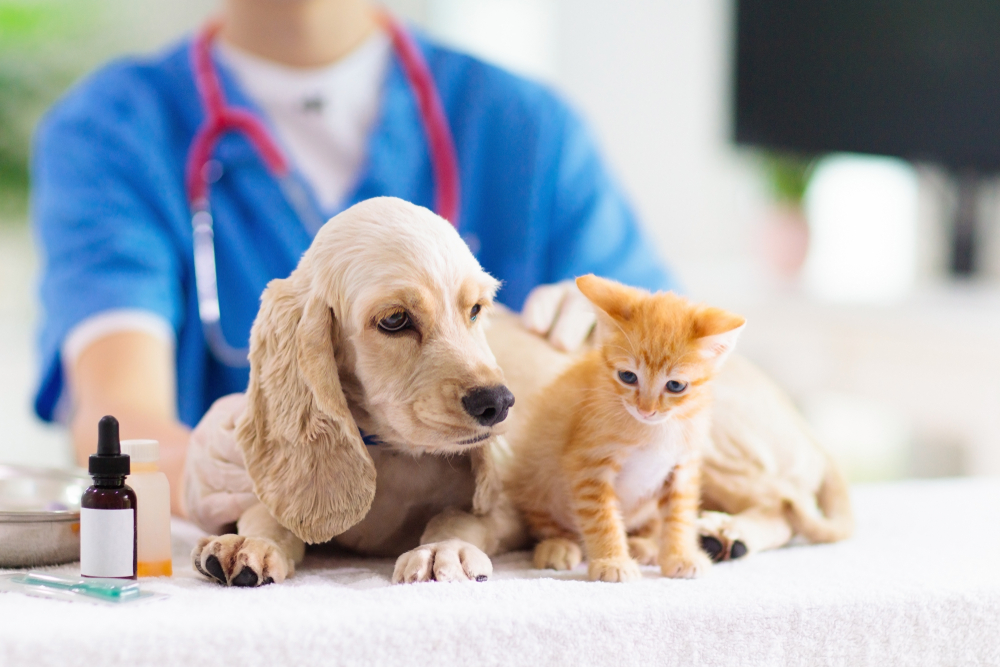


One of the most essential aspects of pet care is ensuring that they receive the necessary vaccinations to protect them against various diseases. This is especially important for puppies and kittens, as their immune systems are still developing and more susceptible to illness.
Vaccinations play a crucial role in the overall health and wellbeing of our pets. They work by introducing a small, harmless component of a virus or bacteria into the animal's body. This stimulates the immune system to produce antibodies, which are proteins that recognize and neutralize harmful pathogens. If the pet is exposed to the actual disease in the future, their immune system will be better prepared to fight off the infection and prevent illness.
Regular vaccinations are vital for both puppies and kittens, as they help to ensure that they grow up to be strong, healthy adults. As a responsible pet owner, it is essential to educate yourself on the specific vaccinations your pets require and the recommended schedule for administering them.
Puppy Vaccination Schedule
A puppy's vaccination schedule typically begins at around six to eight weeks of age and continues until they are around 16 weeks old. During this time, they will receive a series of vaccinations designed to protect them against various diseases.
The core vaccines for puppies include:
Distemper: This highly contagious viral disease affects the respiratory, gastrointestinal, and nervous systems of dogs. It can be fatal, particularly for young puppies with weak immune systems.
Adenovirus: This virus can cause both hepatitis, which affects the liver, and respiratory disease. It is also highly contagious and can be fatal in some cases.
Parvovirus: This highly contagious virus affects the gastrointestinal system and can lead to severe dehydration, vomiting, and diarrhea. Parvovirus is particularly dangerous for young puppies and can be life-threatening if not treated promptly.
Rabies: This is a fatal viral disease that affects the nervous system and can be transmitted to humans through a bite from an infected animal. Vaccination against rabies is required by law in many areas.
In addition to these core vaccines, there are several non-core vaccines that may be recommended for your puppy, depending on factors such as their lifestyle and geographic location. These can include vaccinations against bordetella (kennel cough), leptospirosis, and Lyme disease.
Kitten Vaccination Schedule
Similar to puppies, kittens should begin their vaccination schedule at around six to eight weeks of age, with booster shots administered every three to four weeks until they are around 16 weeks old.
The core vaccines for kittens include:
Feline Panleukopenia (FPV): Also known as feline distemper, this highly contagious viral disease affects the gastrointestinal system and can be fatal, particularly for young kittens.
Feline Herpesvirus (FHV): This virus causes upper respiratory infections in cats, which can lead to symptoms such as sneezing, nasal discharge, and eye inflammation. While not typically life-threatening, the virus can cause severe discomfort for affected cats and is highly contagious.
Feline Calicivirus (FCV): Similar to FHV, this virus also causes upper respiratory infections in cats and is highly contagious. In some cases, it can also lead to oral ulcers and pneumonia.
In addition to these core vaccines, there are several non-core vaccines that may be recommended for your kitten, depending on their specific needs and risk factors. These can include vaccinations against feline leukemia virus (FeLV), feline immunodeficiency virus (FIV), and feline chlamydiosis.
Keeping Track of Your Pet's Vaccination Records
As a responsible pet owner, it is essential to keep accurate records of your pet's vaccinations. These records can be invaluable for both you and your veterinarian, as they provide a clear and concise overview of your pet's immunization history. They can also be useful if you need to provide proof of vaccination for activities such as boarding, grooming, or traveling with your pet.
One way to keep track of your pet's vaccination records is by maintaining a physical folder or binder with all relevant documents, such as vaccination certificates and receipts. Alternatively, you can opt for a digital approach by scanning these documents and storing them on your computer or using a dedicated pet health app on your smartphone.
In addition to keeping track of which vaccines your pet has received, it is also crucial to note when they are due for their booster shots. This will help ensure that your pet remains up-to-date with their vaccinations and continues to be protected against various diseases.
Conclusion
Ensuring that your puppies and kittens receive the necessary vaccinations is a crucial aspect of responsible pet ownership. By providing them with these essential immunizations, you are not only protecting their health but also contributing to the overall wellbeing of the broader pet population.
It is important to consult with your veterinarian to determine the most appropriate vaccination schedule for your pet, taking into consideration factors such as their age, breed, and lifestyle. By keeping accurate records of your pet's vaccinations and adhering to the recommended schedule, you can help ensure that your furry friend grows up to be a strong, healthy, and happy member of your family.
For more on a vaccination schedule for puppies and kittens, visit Lakeville Family Pet Clinic at our office in Lakeville, Minnesota. Call (952) 595-6500 to schedule an appointment today.





